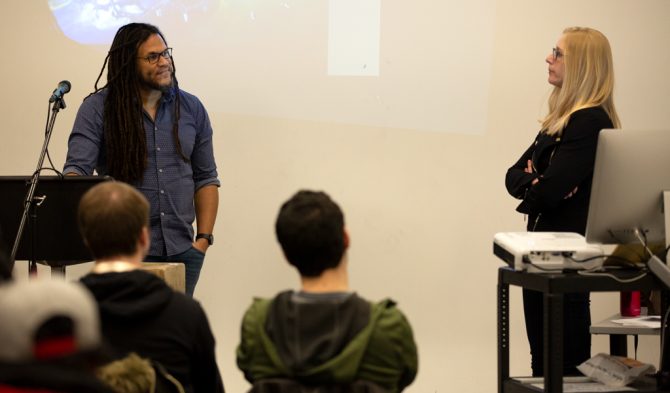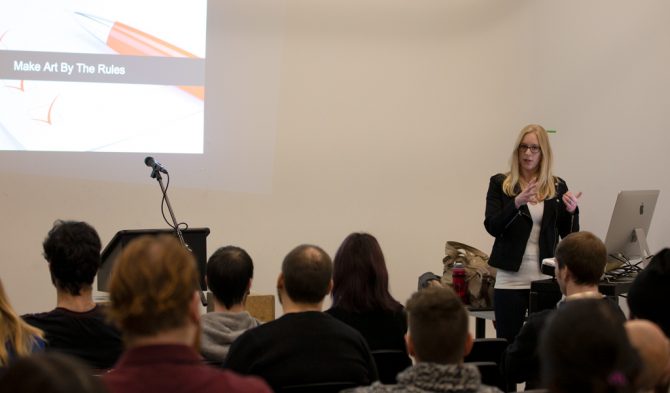Assassin’s Creed, Splinter Cell Level Artist Inspires During Visit with TFS Video Game Students
Splinter Cell. Watch Dogs. Far Cry. Assassin’s Creed. Warframe.
Those are just a handful of the award-winning, blockbuster video game franchises Sarah Cole-Megaro recently discussed with Toronto Film School students during a special guest talk detailing her nearly eight-year career as a level artist for Ubisoft and Digital Extremes.
“One thing that I’m really hoping the students took away from my presentation is the realities of what working in a studio looks like, what career progression looks like, and what to expect once you get started,” said Cole-Megaro, who credits her own career launch at Ubisoft to a ‘right-place, right-time, right-portfolio, talked-to-the-right-person situation’ in February 2012.
“Getting that first job is the hardest step – once you get that first job, once you have a little bit of experience under your belt, once you have your first title, it’s a little easier to change studios, change job positions once you’re actually in. But making that jump is the hardest.”
Cole-Megaro, who graduated from a 3D Animation, Art and Design program, said she didn’t initially go to school with the intention of pursuing a career in video games, but rather one in animated feature films.
It wasn’t until her brother moved in with her during the final year of her three-year program, she said, that her childhood passion for video games was revived and her career path was altered.
“As a kid growing up…my brother and I would sneak downstairs before my parents got up every Saturday morning and load up the Super Nintendo, but as the years went on…I kind of lost interest,” she said, noting that that all changed when she and her brother were reunited under the same roof again.
“Living with him reignited my love of video games…My days became going to class during the day, and then coming home and playing Borderlands, Splinter Cell and Batman with him. So, in my final year, I made the decision that I wouldn’t focus on feature films – I was going to get into game development instead.”

Rob Elsworthy, director of Toronto Film School’s Video Game Design & Animation program, said that by inviting video game artists and designers such as Cole-Megaro into the school to speak with students about their own career paths, he’s hopeful his young charges will be inspired to follow in those visiting mentors’ footsteps.
“Any time we can expose students to people working in the industry, they’re going to give you a vision of what (a career in video games) can look like,” he said.
“If you can hear directly from the horse’s mouth what it’s like to work in the industry, it can inspire you to realize this a normal person, not some magician working in a tower somewhere. They’re just people like you and me…so maybe you can do the same thing.”
For 26-year-old Priscille Beaulieu, who’s currently in her final term of the Video Game Design & Animation program, getting tips from a fellow environment artist – not to mention a female one – was especially uplifting.
“It was very interesting, because we don’t hear a lot about females in the industry,” Beaulieu said of hearing about Cole-Megaro’s career path, which saw her rise in the ranks from junior modeller to level artist over five years at Ubisoft, before she and her husband decided to relocate to London, Ontario, where she’s taken at job at Digital Extremes.
“So it’s very cool to see (a woman) who’s been so successful and hearing that females are more and more in the industry now. I think it’s very exciting and I can’t wait to be truly part of it.”

For Cole-Megaro, the experience of speaking with Toronto Film School’s Video Game Design & Animation students was likewise inspirational.
Her ultimate hope, she said, is that by giving students a framework for what they can expect once they start working professionally, she’ll help push them “leaps and bounds” ahead of other graduating students as they set out to begin their careers in the game industry.
“I think it’s important for this kind of ongoing dialogue between industries and colleges, because our industry is ever-changing – it’s flexible, there’s new processes getting developed, there’s new software and new workflows all the time,” she said.
“Personally, I find coming to colleges and speaking to students who are aspiring to get into the gaming industry really inspiring – especially their zeal for it. They have a lot of good ideas and I want to contribute to helping the next generation of developers get into the industry.”


